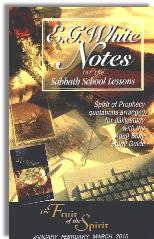|
||||||||||||||
Commentary on "The Fruit of the Spirit is Kindness"
Day 3: Monday, February 1, 2010
Overview
In Monday’s lesson, we are introduced to the case of David manifesting loving kindness to Mephibosheth, somebody who, as the son of the former King Saul, was a potential rival to the throne. Still, because David experienced God’s grace, he gave to Mephibosheth what he had received: unmerited favor. The same truth is exemplified in the life of the woman who was forgiven by Jesus, and the point that our author is making consists, rightfully, in showing that we love and accept others because God first loved us. He has stated correctly: “How important, then, that we keep the Cross and what it means to us, individually, before us at all times.”
Observations
The question raised at this point is related to the context and meaning of what the cross signifies for our author and his Adventist readers. If the atonement was not finished at the cross and the final atonement which happens at the end of the investigative judgment depends on somebody’s right conduct, how is the love of such people the response of a grateful heart to what Christ has done once for all in His sacrifice? If forgiveness—future forgiveness, at least—depends on right behavior and is contingent on somebody’s progress in sanctification, how can somebody’s deeds properly be called an answer to God’s love? Only if forgiveness, justification, and cleansing of all sins is independent of human behavior, independent of what somebody was, is, or will ever be—only then can a person love others and God supremely. Only then a person’s kindness follows the manifestation of God’s love. The investigative judgment turns God’s love upside down and construes a scheme in which God’s ultimate manifestation of love toward somebody depends on that individual’s love and dedication and effort.
Missing from the picture is the fact that in justification not only our past sins but also our future sins are wiped out. In such conditions, however wonderful the words that our author put in today’s lesson, his expectation that his readers should love others because Jesus loved them and be kind to others because God was kind toward them is an impossible task. Given the context of the investigative judgment in which his readers operate, there is no chance a person can achieve the kindness and love expected of them. Only by accepting that not only their past but also their future sins are justified by Jesus’ completed atonement can a person finally experience the love and kindness of Jesus becoming manifest in their lives.
Summary
- The cross must always be kept in front of us—with the understanding that the cross marks the completion of Jesus’ work of atonement.
- If Jesus only began His atonement at the cross, there is no possibility that we can ever love as He loved or be kind as He is kind.
- The investigative judgment is the backdrop for Adventists’ understanding of Jesus’ sacrifice and our justification.
- If the investigative judgment is real, our future is uncertain because our future sins are not atoned at the cross.
- Only by accepting the truth that Jesus died for all our sins at the cross, even those we have not yet committed, can we experience justification and be born again.
- Only by being born again can we have the power of the Holy Spirit in our lives.
GO TO DAY 4
Copyright 2010 BibleStudiesForAdventists.com. All rights reserved. Revised January 27, 2010. This website is published by Life Assurance Ministries, Glendale, Arizona, USA, the publisher of Proclamation! Magazine. Contact email: BibleStudiesForAdventists@gmail.com.
The Sabbath School Bible Study Guide and the corresponding E.G. White Notes are published by Pacific Press Publishing Association, which is owned and operated by the Seventh-day Adventist church. The current quarter's editions are pictured above.
Official Adventist Resources
Standard Edition Study Guide Week 6
Teacher's Edition Study Guide Week 6
Easy Reading Edition Study Guide Week 6
Search the Complete Published Ellen G. White Writings


